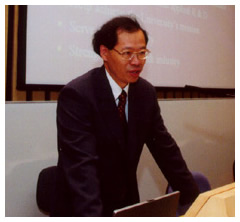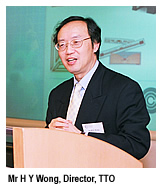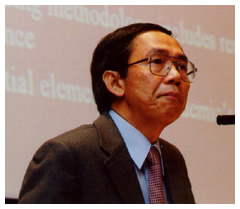Research and postgraduate education: the next five years
Theresa Fox
Research and postgraduate education were the focus of CityU's ninth University Development Forum on 18 September. The SCOPE Lecture Theatre was packed for the Forum, which formed part of the University's strategic plan for 2002 and beyond.
"The purpose of this Forum is to present strategies for the University to strengthen its research culture and capability and to enhance the quality of postgraduate education," said Professor P S Chung, Vice-President (Research) and Dean of the School of Graduate Studies (SGS).
The four focus groups that reported to the Forum consisted of some 50 staff and students from the faculties, schools, the College, the City University Postgraduate Association (CUPA) and responsible offices.
Taught postgraduate degrees
His group homed in on four major recommendations for further development of taught postgraduate programmes:
l Self-financing programmes-to move towards offering most taught postgraduate programmes as self-financing, in line with the directive of the University Grants Committee (UGC); and explore the possibility of setting up an extension centre in Shenzhen to provide CityU self-financing programmes or joint programmes offered with mainland universities.
l Programme structure- implement a credit unit system that provides the required flexibility to attract students and facilitate their studies; and offer a mixed mode of course delivery by complementing classroom teaching with other modes, such as on-line teaching;
l Recruitment of non-local students-provide on-campus accommodation for non-local students: and offer a more flexible mode of study;
l Links with industry and other universities- encourage and facilitate the running of joint programmes with industry and other universities; be more proactive in obtaining sponsorship from industry.
Research degrees
Professor W F Fong, Associate Vice-President (Research) and Associate Dean of SGS, chaired the Focus Group on Research Degrees. His group believes the University should continue to strengthen its research degree education because of the important role it plays in helping the University fulfil its mission to contribute to the advancement of knowledge. This group's recommendations encompass:
l Quota limits-enrich the University's research capabilities by encouraging the admission of research students through external research grants; and maximizing the use of the UGC quota;
l Quality of research education supervision-to enhance and monitor the quality of research education supervision;
l Student admission-to attract good quality local applicants; to achieve a more international mix of non-local students; to aim at training high-level research personnel by encouraging the admission of PhD students; and to ascertain the quality and ability of applicants before admission;
l External links-to encourage and facilitate joint supervision of research students with research partners in mainland and overseas universities.
Applied R&D
l What is considered as true applied R&D-any research activities that have relevance to, and address the needs of, society; have academic merit and potentially publishable results; are likely to be commercially viable; and can be implemented within a reasonable time frame; encompasses all disciplines;
l The changing scene-global trend for universities to engage in research that has direct application; increased research funding from the private sector; the government's new industrial policy on innovation and technology;
l Current practices for supporting/funding applied R&D-component of annual budget to faculties, schools and College; various funding schemes; Professional Secondment Scheme;
l Recommendations for promoting applied R&D-policies at institutional, departmental and staff levels; and strategies, including motivating staff, infrastructural support, publicizing research results, and collaboration with mainland institutions.
Research infrastructure and culture
l The "walking with two legs" strategy-the University should continue to adopt the strategy, which places equal emphasis on teaching and research at the University level;
l Funding selectivity as a key strategy -to reaffirm the policy of funding selectivity as a key strategy;
l Portfolio approach for staff appraisal -to adopt a portfolio approach to assess the overall performance of staff;
l The Research Assessment Exercise (RAE) and new dimensions for assessments-problems with the current RAE were examined; new assessment criteria for evaluating increasingly interdisciplinary research include innovative designs; sustained collaboration with industry; software products; patents leading to licenses; and spin-off venture companies;
l Research quality and culture-CityU to publicize and reward good research performance; departments to take into account a range of research performance indicators in personnel decisions.
Professor Chung summed up his presentation with a "SWOT" analysis of CityU:
l Strengths-excels in research in some areas; is the forerunner in applied R&D initiatives; is young, with little historical baggage;
l Weaknesses-small research student quota; inclusion of College staff in UGC's research performance indicators;
l Opportunities-increase in government funding for applied research work; potential developments in the administration of the College;
l Threats-negative perceptions of CityU associated with being a "new university"; danger of staff doing research at the expense of teaching and vice versa; implications for CityU of the current economic downturn.
Following the presentations, staff had the opportunity to contribute their comments, which will be incorporated into the recommendations, as appropriate. The recommendations will be submitted to the University management for incorporation in AURORA II. Staff who were unable to attend the Forum are invited to send their comments to: opforum@cityu.edu.hk.


